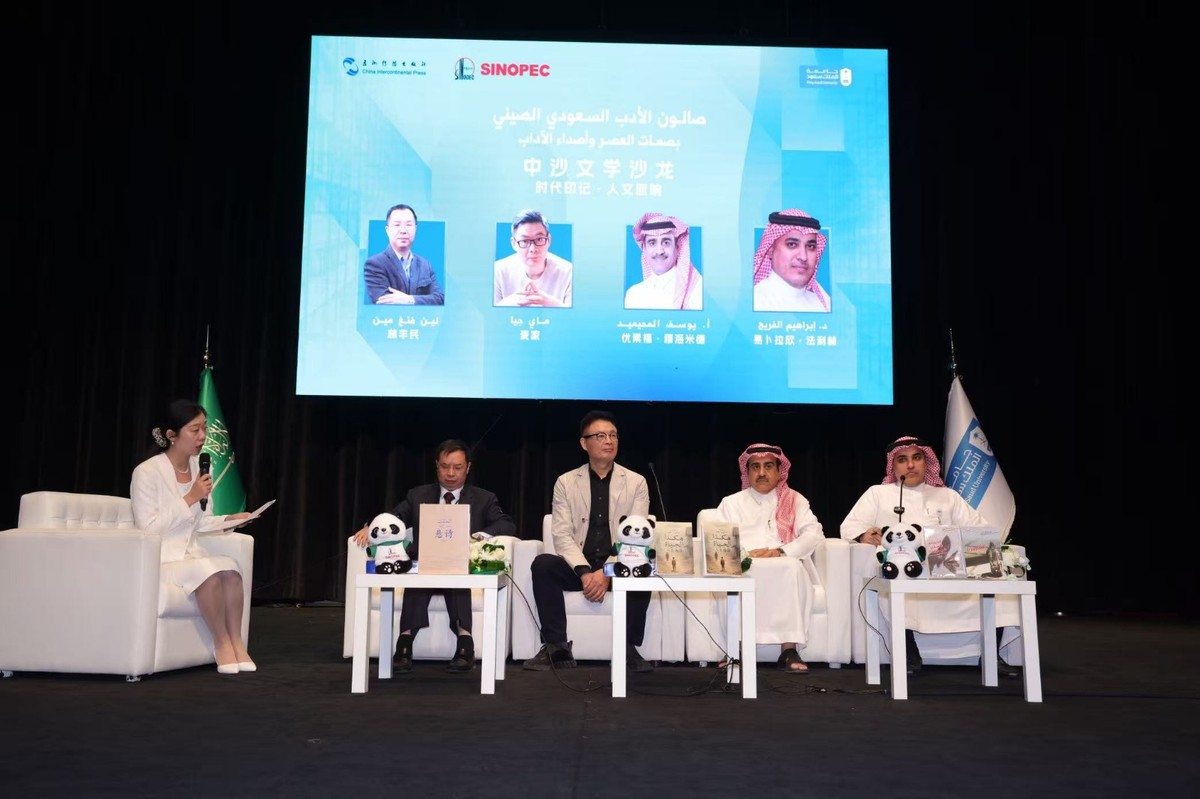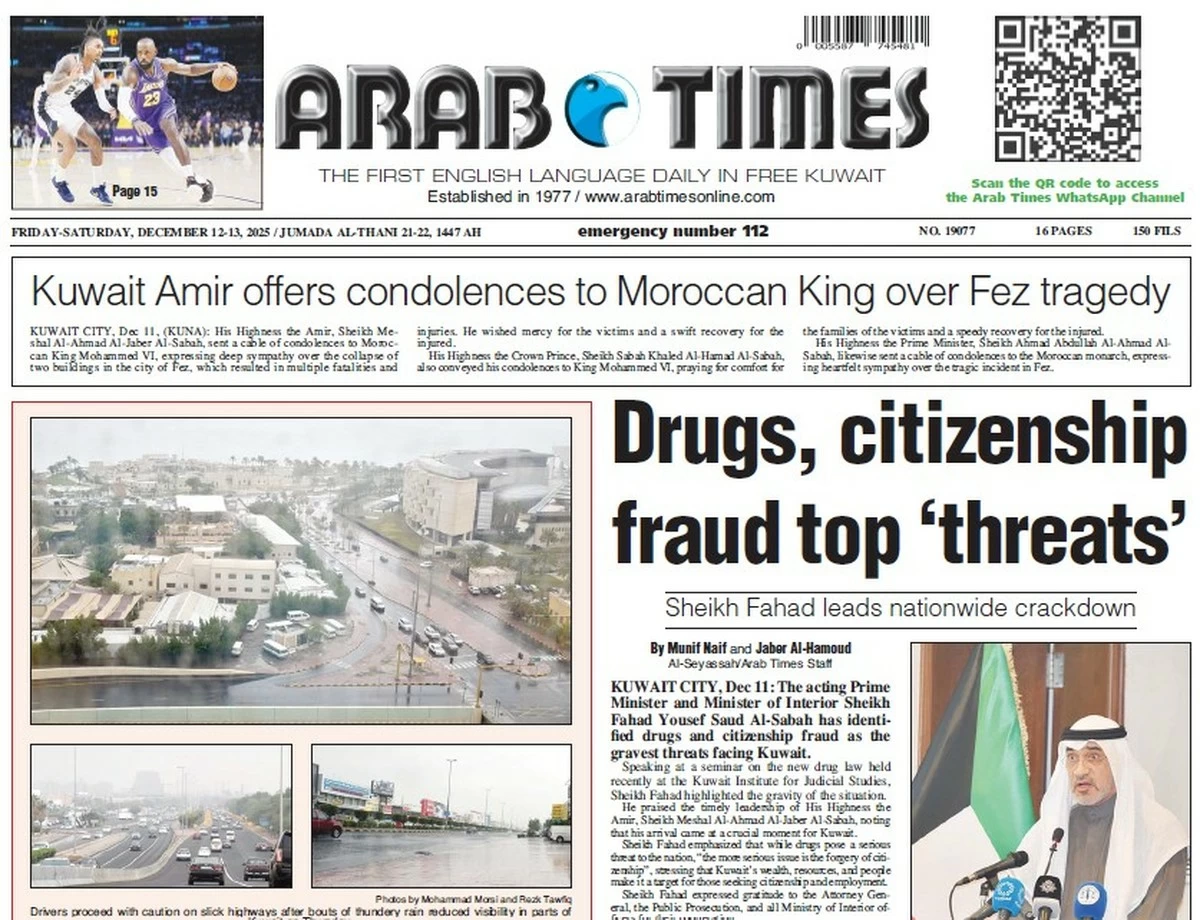09/10/2025
09/10/2025

RIYADH, Oct 9: The China–Saudi Literary Salon, themed “Imprints of Time·Echoes of Humanity”, was successfully held at the Hamad Al-Jasser Hall of King Saud University in Riyadh. Jointly organized by China Intercontinental Press, Sinopec Group Middle East Office and King Saud University, the event brought together renowned writers and literary enthusiasts from both China and Saudi Arabia to explore the humanistic spirit and contemporary significance embodied in literary creation.
In the opening remarks, Dr. Osama Al-Ghamdi, Assistant to Vice President for Educational and Academic Affairs of King Saud University, noted that in recent years, the university has cooperated with Chinese publishing institutions to complete mutual translations of more than ten thematic works, covering literature, cultural heritage, and academic studies. These exchanges have helped introduce the literary achievements of both the Arab world and China to a broader global audience. He added that during Chinese President Xi Jinping’s visit to Saudi Arabia, the two countries signed over a dozen agreements covering energy, technology, cloud services, biotechnology, digital transformation, and culture. He emphasized that such literary and cultural exchanges play an important role in helping young people in both countries appreciate the value of life, cultivate perseverance and innovation, and better prepare for the future.
Zhao Haiyun, Deputy Director General of the Import and Export Administration Bureau of the Publicity Department of the CPC Central Committee, noted that China and Saudi Arabia share a wealth of cultural values and traditions that provide a strong foundation for mutual learning and exchange. Numerous literary translation projects are already under way as part of ongoing cultural cooperation. He stated that the Chinese government will continue to provide strong and sustained support for literary and cultural exchanges, contributing to greater mutual understanding among Asian civilizations. “China’s cultural exchange policy,” Zhao said, “is rooted in remembering where we came from, learning from others, and working together to build a community with a shared future for humankind.”
Lian Mingxiang, Chief Representative of the Sinopec Group Middle East Office, remarked that as a long-established energy enterprise in Saudi Arabia, Sinopec is not only an economic participant but also a cultural communicator. Lian said, “Oil is the lifeblood of industry, while literature is the nectar of the soul. We hope to build a ‘pipeline’ for the exchange of hearts and minds between our peoples. Today’s literary salon is exactly such a ‘cultural conduit’—one that brings both warmth and depth to cooperation.”
During the dialogue session, four distinguished literary figures from China and Saudi Arabia exchanged insights on topics such as “the relationship between the individual and the era in literary creation,” “the exploration of human nature in stories of our times,” and “the shared and differing ways in which Chinese and Saudi writers interpret the individual as a bearer of historical civilization.” The discussions, which ranged from depictions of personal destiny to the transmission of the spirit of the times, from the expression of civilizational identity to the probing of human essence, vividly demonstrated the unique charm of both Chinese and Saudi literature and the emotional resonance that binds the two cultures together.
Mai Jia, renowned Chinese writer who has won the Mao Dun Literature Prize, shared with Saudi writers and readers the story of Hassan of Baghdad from the Arabic classic One Thousand and One Nights. In the tale, Hassan endures hardship and loss in his quest for fortune in Cairo, only to find true wealth and self-understanding upon returning home in Baghdad. “Life requires trials and challenges,” Mai Jia reflected. “It is through hardship and growth that we discover we already possess everything we need. Hassan’s journey, in a sense, mirrors that of the colonel in my novel The Colonel and the Eunuch. That is what life is about—what The Colonel and the Eunuch is all about.”
Yousef Al-Mohaimeed, acclaimed Saudi writer who has won the Saudi Ministry of Culture Book Award, also shared insights into his novel The Traps of Scent. He remarked that Hassan’s journey represents not only a pursuit of material wealth but also a search for spiritual meaning. “Everything we hold in our hands may already be our true treasure,” he said. Al-Mohaimeed explained that The Traps of Scent, which follows three protagonists who perceive the world through scent, delves into the intricate ties between human nature, memory, and moral conflict, revealing the psychological tension and quest for redemption of individuals amid modernization.
Prof. Lin Fengmin, Professor in the Department of Arabic, School of Foreign Languages, Peking University, and President of the Chinese Association for Arabic Literature Studies, challenged the poet Adonis’s assertion that “translation is betrayal.” He stressed that it is precisely through translation that world literature has come into being, “making the world smaller and the human heart larger.” Translation, he said, is not merely the transfer of words but the transplantation of emotion and the broadening of vision. “Every successful translation,” he added, “is a clear echo of humanity—it allows different civilizations to see and enrich themselves through each other’s reflection.”
Prof. Ibrahim AlFallay from the College of Humanities and Social Sciences at King Saud University discussed the revival of women’s literature in Saudi Arabia. He observed that through shared themes such as love and family, we can perceive the social transformations brought about by changes in gender relations and societal structures. These outstanding works, he said, which embody universal human values, help distill shared emotions and wisdom, offering spiritual resources for building a more harmonious world.
The event concluded to warm applause. Through literature, Chinese and Saudi writers shared creative insights and exchanged cultural wisdom, bringing fresh energy and resonance to the ongoing cultural dialogue between the two countries.


